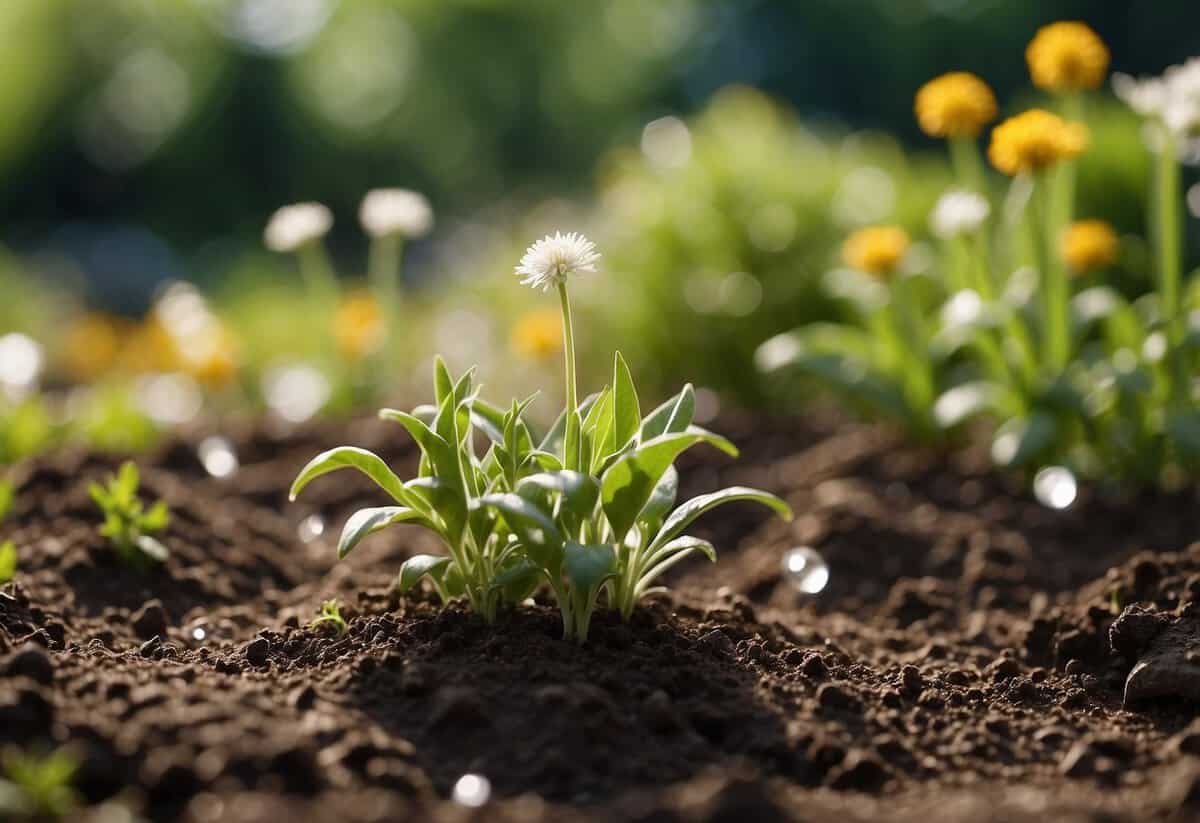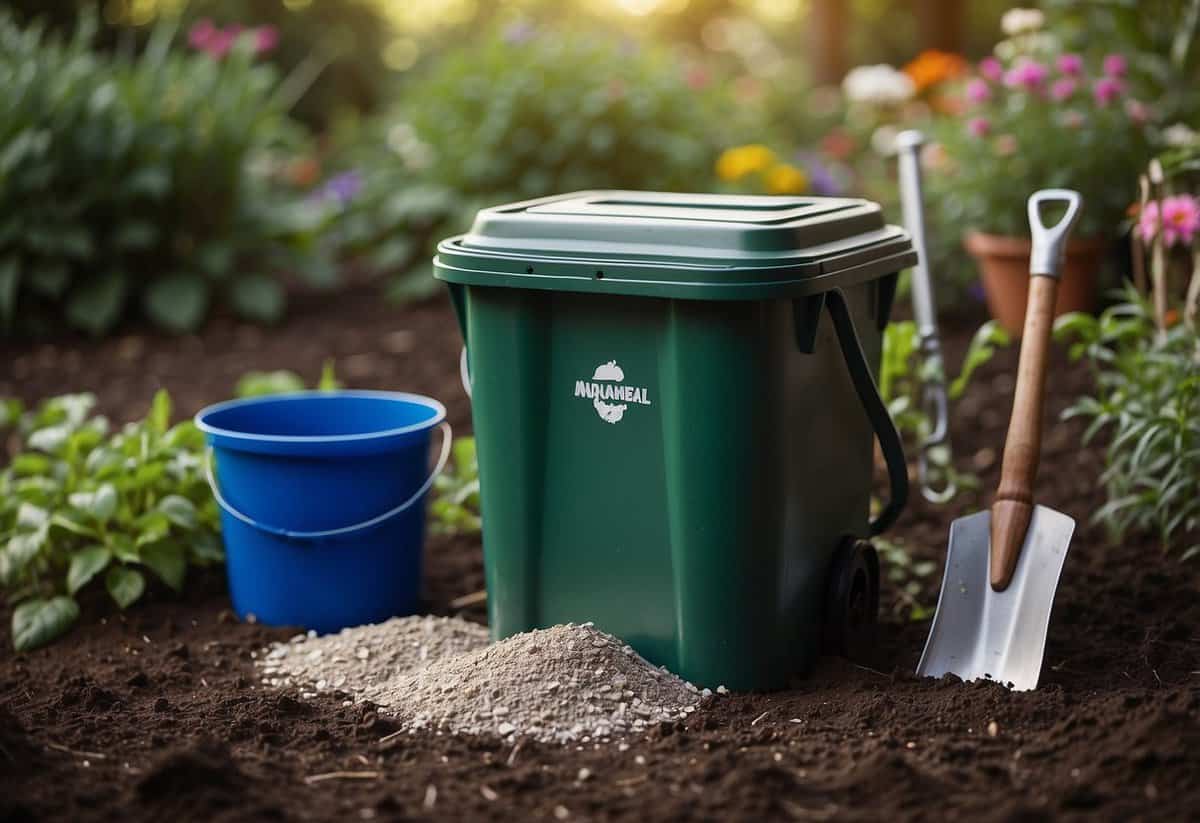Baking Soda Garden Tips: Simple Solutions for a Flourishing Garden
Gardening can be a rewarding hobby, especially when you discover new and effective ways to care for your plants. One such secret ingredient many gardeners swear by is baking soda. This common household item has a range of uses in the garden, making it an invaluable tool for both beginners and experienced gardeners.

How can baking soda make your garden healthier and more vibrant? From helping to prevent fungal issues to enhancing the growth and appearance of your plants, baking soda offers several benefits that can transform your green space. Whether you’re looking to improve soil quality, protect your plants from pests, or simply keep your garden looking its best, baking soda might be just what you need.
1) Neutralize Soil Acidity

Baking soda can help balance the pH in your garden. If your soil is too acidic, lightly sprinkle baking soda around the base of your plants.
It’s important to check the pH level of your soil regularly. This will help you understand how much baking soda to use.
For best results, mix the baking soda into the top layer of soil. This ensures it interacts well with the soil and helps to neutralize acidity effectively.
For more details, visit Baking Soda in Soil.
2) Clean Garden Tools

Baking soda is great for cleaning your garden tools. It helps remove dirt and grime effectively.
To clean, mix baking soda with water to make a paste. This paste can be applied to your tools. Scrub gently and then rinse off.
This method also helps prevent rust on your tools, keeping them in good condition.
3) Repel Pests Naturally

You can use baking soda to keep pests away from your garden plants.
Mix baking soda with a bit of water, olive oil, and mild dish soap. Spray this on plants to deter aphids and spider mites.
For cockroaches, blend baking soda with sugar and place it where roaches frequent. It’s an easy, natural solution to protect your garden.
Focus on spraying early in the morning when the weather is cool. This helps the leaves to dry properly.
4) Control Fungal Diseases

Baking soda is great for dealing with fungal diseases on plants. Mix one tablespoon of baking soda with one gallon of water. Add a few drops of liquid soap to help it stick to the leaves.
Spray the mixture on affected plants every 7-10 days. Make sure to cover both the tops and bottoms of the leaves. This helps fight off powdery mildew and other fungi.
5) Sweeten Tomatoes

You can use baking soda to make your tomatoes taste sweeter. Simply sprinkle a small amount around the base of your tomato plants.
Baking soda helps lower the soil’s acidity, which leads to sweeter tomatoes. Be careful not to overdo it; too much baking soda can harm your plants.
Try this simple trick and enjoy tastier tomatoes in your next garden salad!
For more details, check out this guide.
6) Eliminate Weeds

You can use baking soda to get rid of pesky weeds in your garden. Sprinkle about a teaspoon of baking soda on each weed, making sure the foliage and stem are covered.
It’s best to do this on a sunny day. The baking soda will work quickly to dry out and kill the weeds.
For a more precise application, mix baking soda with water and spray it directly onto the weeds. This can help target the unwanted plants without harming the surrounding grass and flowers. Don’t forget to wet the leaves first to help the baking soda stick.
7) Revive Plants

You can revive tired-looking plants with a simple baking soda solution. Mix 1 teaspoon of baking soda with 2 cups of water. Spray this solution on your plants’ leaves.
The baking soda helps to reduce fungal infections and keeps your plants healthy.
Use this spray once a week for the best results. It’s an easy way to perk up your garden.
For more tips, check out how baking soda can revitalize your spring garden.
8) Freshen Compost Bins

Using baking soda in your compost bin can help keep it fresh and odor-free. Sprinkle a bit of baking soda to absorb excess moisture and reduce smells.
If your compost bin tends to attract flies, a light dusting of baking soda can also help keep those pests away. Just be careful not to overdo it.
9) Help Germination

Baking soda can give your seeds a boost during germination. Mix a teaspoon of baking soda into a cup of water. Soak your seeds in this solution for a few hours before planting. This can help soften the seed coat, making it easier for the seedling to break through.
Using baking soda in this way can increase your seeds’ chance of sprouting successfully.
10) Balance pH Levels in Pools

Using baking soda can help keep your pool’s pH levels just right. If the pH level is too low, it might sting your eyes when swimming. Measure your pool’s volume first. Then, check a baking soda dosage chart for how much to add.
Start with half the recommended amount. Let it dissolve and then retest the pH levels. If needed, you can always add more. Run your pool’s circulation system to help distribute the baking soda evenly.
Benefits of Baking Soda in Your Garden

Baking soda has multiple uses in gardening that can help improve plant health. It can enhance soil pH, protect plants from pests, and prevent fungal diseases.
Improves Soil pH Balance
Using baking soda can help balance your soil’s pH levels. If your soil is too acidic, baking soda’s alkaline properties can adjust it.
To test soil acidity, mix soil with water and add baking soda. If it bubbles, your soil is acidic. This can benefit plants that thrive in slightly alkaline conditions like cucumbers and kale.
Apply a light baking soda solution to the soil. Generally, a tablespoon of baking soda in a gallon of water works well. Make sure to apply cautiously and test pH levels frequently. Overuse can lead to overly alkaline soil, harming your plants.
Natural Pest Control
Baking soda can protect your garden from pests. It disrupts the bodies of many small insects, killing or repelling them. Mix it with flour for best results.
Dust this mixture on the leaves and soil to target pests like caterpillars and aphids. It’s particularly useful where pests usually gather, such as the undersides of leaves.
Another way is to mix baking soda with dish soap in water. Spray this solution directly on visible insects. Be sure to use it during cool parts of the day to avoid leaf damage from the sun.
Fungal Protection
Baking soda can help prevent fungal diseases on plants. It alters the pH on leaf surfaces, making it hard for fungi to survive. This is especially useful for crops like tomatoes and roses, which are prone to diseases like powdery mildew.
To make a fungal spray, combine baking soda, water, and a small amount of vegetable oil or soap. Spray the mixture on affected plants weekly. Make sure to cover both the tops and bottoms of leaves.
This method can be an effective preventive measure. Continuous use helps ensure your plants stay healthy and vibrant, reducing the stress and damage caused by fungus.
Practical Tips Using Baking Soda

Using baking soda in your garden can help with weed control, keeping your garden tools clean, and improving your compost. These tips will make your gardening tasks easier and more effective.
Weed Control Solutions
You can use baking soda to manage weeds in your garden. Sprinkle a thick layer of baking soda directly on the weeds. This works well on weeds growing in cracks of sidewalks or patios.
Another method is to dissolve one tablespoon of baking soda in a cup of water. Then pour the solution on the weeds. This approach helps prevent weed growth without harming your plants.
Baking soda is a natural way to fight weeds and keep your garden looking neat.
Cleaning Garden Tools
Keeping garden tools clean is essential. Mix a solution of one-fourth cup of baking soda and one gallon of water. Soak your tools in this solution for about 30 minutes.
Use a scrub brush to clean off any dirt or rust. The baking soda acts as a mild abrasive, effectively removing grime without damaging the tools. Rinse the tools thoroughly with water and dry them to prevent rusting.
Regular cleaning with baking soda ensures your tools last longer and work better.
Enhancing Compost Quality
Enhancing the quality of your compost is easy. Baking soda helps balance the pH levels in your compost pile. Sprinkle a small amount of baking soda over the compost once a week.
This helps control odors and speeds up the decomposition process. Be careful not to use too much, as it can slow down the composting process by making the environment too alkaline.
Using baking soda in your compost helps create rich, high-quality compost for your garden.







